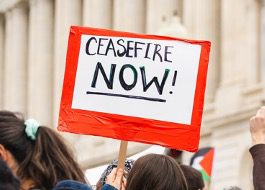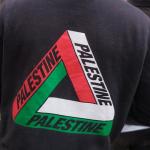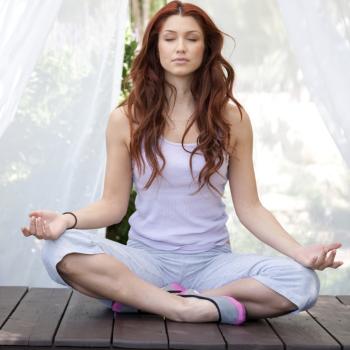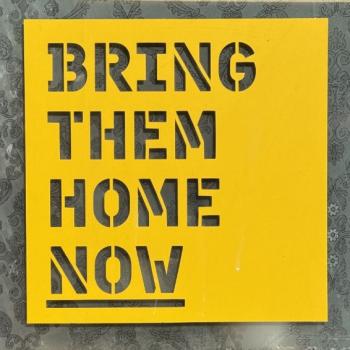In the last post, we began considering the question, can Christians support oppressed groups that have risen up violently against their oppressor?
I personally know many Christians who had sympathy for the Palestinian struggle two months ago, but have taken a giant step back, now that a Palestinian group has turned to violent means to achieve rights for their people. Others have never backed Palestinian rights because of the “terrorist” stigma.
The definition of terrorism and who gets to assign the label is a whole separate topic for another day. For now, let us look further into the question of violent resistance against oppression.
Someone (hi, Michael!) commented to me, “I am a follower of Jesus, who preached and lived justice and peace. How can I support a group that attacks innocent civilians?” (He was referring in that moment to Hamas – but his words describe Israel too.) My friend wants to advocate for the Palestinian people, but doesn’t want to promote violence.
The fantasy of a virtuous victim
Christians in the West can be very idealistic. We want a virtuous victim. This is a fantasy. It is understandable, forgivable.
There is probably no such thing as an oppressed group with a perfect track record. There is definitely no such thing as a powerful group with a perfect track record.
Granted, Hamas are no angels. They are corrupt, they are harsh toward their own people. They have blood on their hands – not just from October 7th, but also from several dozen deaths over their twenty years of launching rockets at Israel.
My friend’s instinctive gravitation toward the Palestinian people shows that his moral compass is in working order. He need not hesitate. Hamas should not be a deal-breaker. We need to overcome stereotypes that we’ve internalized all our lives. Not an easy job, but it has to be done. Knowledge is a good first step.

A bit of background
First, let me point out that under international law, resistance against occupation – including armed resistance – is permitted. The existence of Hamas as a group organized to resist Israeli domination is perfectly legal and logical. Very few people groups would put up with the kind of treatment the people of Gaza receive without resisting.
Yes, contrary to what Israel’s supporters would have you believe, Gaza is indeed under occupation. It differs from the military occupation of the West Bank, in that Israel controls Gaza from just outside its borders – directing the entrance and exit of people and goods, governing the sky above Gaza, the ground below Gaza, and the sea beside Gaza, without being present inside Gaza.
By the way, the long-term (now fifty-six years), belligerent occupation of the Palestinian territories is a violation of international law. In fact, by virtue of the occupation, Israel has certain obligations to keep the people under its occupation safe and in good health. Israel is not following through with these obligations.
In 2007, Israel also imposed a crushing blockade on the people of Gaza (it still continues to this day), which is collective punishment – a violation of international law (read more about Israel’s blockade here and here). The blockade has left an entire generation starving and malnourished, bitter, and battling poverty – with no end in sight.
In summary: resistance is legal; occupation and blockade are illegal.
The baby and the bathwater
Of course, there are limits to what constitutes legal resistance, and members of the Hamas organization went beyond those limits when they killed civilians on October 7th (in case you haven’t heard, many of the victims that day were actually killed by the Israeli military).
Having acknowledged Hamas’ failure, let us proceed with care. Let’s not throw out the baby with the bathwater.
If we say (as I’ve heard countless times in the past few weeks), “nothing justifies the murder of civilians,” then we must apply that perspective across the board. Sadly, Israel has committed many massacres, and the vast majority of its victims have been civilians.
If Hamas’ violence makes it ineligible for our support, we can not in good conscience support Israel either (or the United States, for that matter, or our oil-rich ally Saudi Arabia, to name a few entities).
In fact, Israel has killed over 25,000 Palestinians since 2000 – that is ten times the number of Israelis killed by Palestinians in the same time period.
If it sounds like I’m trying to paint Hamas as the lesser of two evils, or Hamas as the “good guys” and Israel as the “bad guys,” that is not my intention. This is about something else entirely.
This is about oppression and justice.
For people of faith, this is everything – or it should be.
Israel’s policies made Hamas inevitable (Israel and the US also funded Hamas in its early days). As Israeli journalist Gideon Levy wrote just two days after Hamas’ attack, “Israel Can’t Imprison Two Million Gazans Without Paying a Cruel Price.”
The young men who carried out the attack had spent almost their whole lives living under blockade, and had experienced wars from an early age. They joined the resistance group to defend their people, and to fight for freedom and justice for their families.
Every oppressed Palestinian longs, not to destroy Jews, but to experience justice. No person, no organization, no state has fought for them effectively, so they have taken matters into their own hands.
We, Christians, we should have taken up the Palestinian cause long ago. Not because they are righteous victims, but because they are oppressed. They are the people that captured Jesus’ heart.
Jesus called us to have compassion for those in need. When we see that the people of Palestine are in desperate need, we can recognize that Hamas is a resistance group that grew out of a desperate need to resist. We don’t have to approve of their actions, only to acknowledge where they are coming from.
If support for a resistance group feels like selling out to worldly interests, consider this: because of our privilege as residents of a prosperous, powerful nation, we can not begin to imagine the life of an average Gazan.
The level of despair that many of them live with for their entire lives is beyond our comprehension. We are called to minister to the suffering, and in doing so, we are ministering to Jesus. If this realization doesn’t soften our hearts, there is something wrong with our hearts.
What do Palestinians need from us?
Palestinians don’t need us to approve of their worst actions.
They don’t need us to shoot rockets or hate Jews.
They do need us – they need the world – to care about their people’s oppression.
When we support the oppressed, we’re not supporting violence. We’re supporting the oppressed – some of whom have resorted to violence. We’re supporting the oppressed – all of whom have been victims of violence all their lives. We’re joining the fight for justice.
And it’s not their job to be Christlike. It’s ours.
Jesus didn’t take the side of the innocent, but of the oppressed, the sinner, the loner.
Jesus didn’t say, “because you’ve slept around, I can’t help you,” or “because you stole money,” or “because you denied me/betrayed me/called for my death,” or “because you’re not part of my tribe, I’m not going to be able to help you.”
If we want to participate in bringing about justice, we are going to have to choose. If we stay on the fence, we are complicit in the perpetuation of injustice.
Grapple with the facts.
Challenge your assumptions.
Recognize who is the oppressor and who is the oppressed.
Ask yourself: could I live with the Israeli boot on my neck all my life without fighting back?
See if you can find the courage to forgive Hamas for their worst actions, then advocate for a people group that just wants to live in peace and hope.
I invite you to subscribe to my newsletter. I write about the Palestine-Israel issue regularly, and other issues relevant to progressives or those considering becoming progressive. If you would like to comment on this post, please pop over to my Facebook page. All of my posts are there and open to constructive comment. I welcome your thoughts.
RELATED READING:
- Why support for Palestinian resistance is the right response for Christians
- Latest from Gaza: in a crowded prison, but alone in the world
- 4 things you can do right now to help bring peace to Palestine and Israel
- A powerful response to Netanyahu’s shameless abuse of the Bible
- This thought experiment will make you smarter about Gaza and Israel
- Getting real about Palestine with Spiritual Brewpub
- A Palestinian Pastor’s powerful message to us: “it’s time to stop praying”
- Christians: Why do we skimp on compassion when it comes to Palestinians?
- Don’t compromise truth on Israel and Palestine
- What People Of Faith Need To Know About Gaza And Israel Right Now
- In Gaza, she now inhabits a solitary space between life and death
- In recordbreaking heat, Israel intentionally impedes Palestinian families’ access to water














